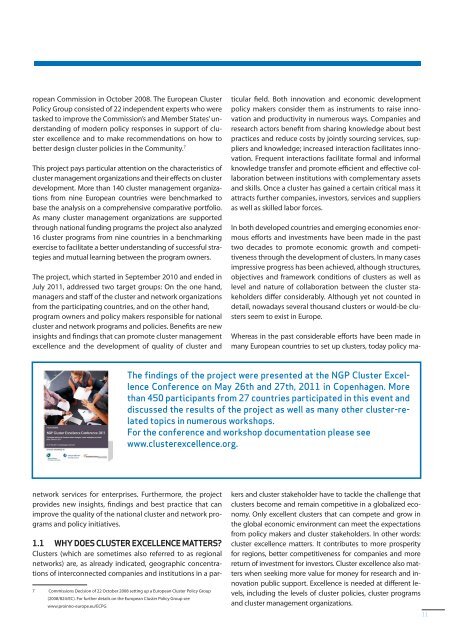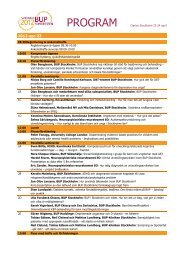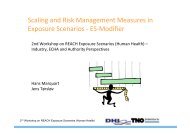Clusters are individuals - VDI/VDE-IT
Clusters are individuals - VDI/VDE-IT
Clusters are individuals - VDI/VDE-IT
You also want an ePaper? Increase the reach of your titles
YUMPU automatically turns print PDFs into web optimized ePapers that Google loves.
opean Commission in October 2008. The European Cluster<br />
Policy Group consisted of 22 independent experts who were<br />
tasked to improve the Commission’s and Member States’ understanding<br />
of modern policy responses in support of cluster<br />
excellence and to make recommendations on how to<br />
better design cluster policies in the Community. 7<br />
This project pays particular attention on the characteristics of<br />
cluster management organizations and their effects on cluster<br />
development. More than 140 cluster management organizations<br />
from nine European countries were benchmarked to<br />
base the analysis on a comprehensive comparative portfolio.<br />
As many cluster management organizations <strong>are</strong> supported<br />
through national funding programs the project also analyzed<br />
16 cluster programs from nine countries in a benchmarking<br />
exercise to facilitate a better understanding of successful strategies<br />
and mutual learning between the program owners.<br />
The project, which started in September 2010 and ended in<br />
July 2011, addressed two target groups: On the one hand,<br />
managers and staff of the cluster and network organizations<br />
from the participating countries, and on the other hand,<br />
program owners and policy makers responsible for national<br />
cluster and network programs and policies. Benefits <strong>are</strong> new<br />
insights and findings that can promote cluster management<br />
excellence and the development of quality of cluster and<br />
ticular field. Both innovation and economic development<br />
policy makers consider them as instruments to raise innovation<br />
and productivity in numerous ways. Companies and<br />
research actors benefit from sharing knowledge about best<br />
practices and reduce costs by jointly sourcing services, suppliers<br />
and knowledge; increased interaction facilitates innovation.<br />
Frequent interactions facilitate formal and informal<br />
knowledge transfer and promote efficient and effective collaboration<br />
between institutions with complementary assets<br />
and skills. Once a cluster has gained a certain critical mass it<br />
attracts further companies, investors, services and suppliers<br />
as well as skilled labor forces.<br />
In both developed countries and emerging economies enormous<br />
efforts and investments have been made in the past<br />
two decades to promote economic growth and competitiveness<br />
through the development of clusters. In many cases<br />
impressive progress has been achieved, although structures,<br />
objectives and framework conditions of clusters as well as<br />
level and nature of collaboration between the cluster stakeholders<br />
differ considerably. Although yet not counted in<br />
detail, nowadays several thousand clusters or would-be clusters<br />
seem to exist in Europe.<br />
The findings of the project were presented at the NGP Cluster Excellence<br />
Conference on May 26th and 27th, 2011 in Copenhagen. More<br />
than 450 participants from 27 countries participated in this event and<br />
discussed the results of the project as well as many other cluster-related<br />
topics in numerous workshops.<br />
For the conference and workshop documentation please see<br />
www.clusterexcellence.org.<br />
network services for enterprises. Furthermore, the project<br />
provides new insights, findings and best practice that can<br />
improve the quality of the national cluster and network programs<br />
and policy initiatives.<br />
1.1 WHY DOES CLUSTER EXCELLENCE MATTERS<br />
<strong>Clusters</strong> (which <strong>are</strong> sometimes also referred to as regional<br />
networks) <strong>are</strong>, as already indicated, geographic concentrations<br />
of interconnected companies and institutions in a par-<br />
7 Commissions Decision of 22 October 2008 setting up a European Cluster Policy Group<br />
(2008/824/EC). For further details on the European Cluster Policy Group see<br />
www.proinno-europe.eu/ECPG<br />
Whereas in the past considerable efforts have been made in<br />
many European countries to set up clusters, today policy makers<br />
and cluster stakeholder have to tackle the challenge that<br />
clusters become and remain competitive in a globalized economy.<br />
Only excellent clusters that can compete and grow in<br />
the global economic environment can meet the expectations<br />
from policy makers and cluster stakeholders. In other words:<br />
cluster excellence matters. It contributes to more prosperity<br />
for regions, better competitiveness for companies and more<br />
return of investment for investors. Cluster excellence also matters<br />
when seeking more value for money for research and innovation<br />
public support. Excellence is needed at different levels,<br />
including the levels of cluster policies, cluster programs<br />
and cluster management organizations.<br />
11

















